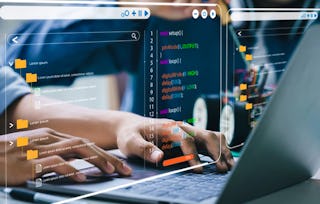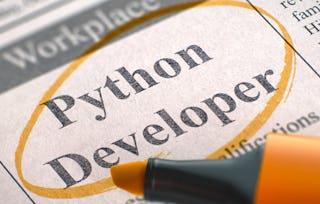This introductory course is designed for beginners and individuals with limited programming experience who want to embark on their software development or data science journey using Python. Throughout the course, learners will gain a solid understanding of algorithmic thinking, Python syntax, code testing, debugging techniques, and modular code development--essential skills for a successful career in software engineering, development, or data science.

Python Programming Fundamentals

Python Programming Fundamentals
This course is part of Programming for Python Data Science: Principles to Practice Specialization



Instructors: Andrew D. Hilton
Access provided by Syrian Youth Assembly
21,428 already enrolled
65 reviews
What you'll learn
Create algorithms and programs using a logical Seven Step framework.
Create useful test cases and efficiently debug Python code.
Apply Python basics (conditionals, loops, mathematical operators, data types) to build a Python program from scratch to solve a data science problem.
Skills you'll gain
Details to know

Add to your LinkedIn profile
See how employees at top companies are mastering in-demand skills

Build your subject-matter expertise
- Learn new concepts from industry experts
- Gain a foundational understanding of a subject or tool
- Develop job-relevant skills with hands-on projects
- Earn a shareable career certificate

There are 4 modules in this course
This module, you will learn best practices for developing code in any language by beginning with an algorithm: a stepwise approach to solving a problem. You’ll then apply the concepts by developing your own algorithms and properly identifying when to use specific data types in Python.
What's included
9 videos12 readings4 assignments
This Module, you will learn how to take the logical process of algorithm design and translate an algorithm into functional Python code. You will apply this by correctly identifying proper Python syntax for a given algorithm, and then subsequently by creating your own Python program for a given algorithm.
What's included
13 videos8 readings5 assignments4 programming assignments
This module, you will learn different approaches to testing Python code, and methods for debugging code. You will apply this by conducting a code review, identifying opportunities to use asserts to debug code, and generating your own test cases.
What's included
6 videos8 readings3 assignments
This module, you will learn how to filter and perform operations (logical and mathematical) across a given dataset, and how to create modular code that can be used in discrete pieces. You will apply this by writing your own functions to identify a list item with a given property, and writing a program to calculate a set of conclusions from a given dataset.
What's included
7 videos5 readings1 assignment4 programming assignments2 discussion prompts
Earn a career certificate
Add this credential to your LinkedIn profile, resume, or CV. Share it on social media and in your performance review.
Instructors

Offered by
Why people choose Coursera for their career

Felipe M.

Jennifer J.

Larry W.

Chaitanya A.
Learner reviews
- 5 stars
56.06%
- 4 stars
18.18%
- 3 stars
6.06%
- 2 stars
7.57%
- 1 star
12.12%
Showing 3 of 65
Reviewed on Oct 10, 2023
Learning made easy. This is so rich yet easy to follow. I certainly recommend this course!!
Reviewed on Jan 25, 2025
I really liked the step by step approach described in this course to solve a problem.
Reviewed on Nov 22, 2025
Very thorough course and is still provides challenge as a beginner course.
Explore more from Computer Science
¹ Some assignments in this course are AI-graded. For these assignments, your data will be used in accordance with Coursera's Privacy Notice.






